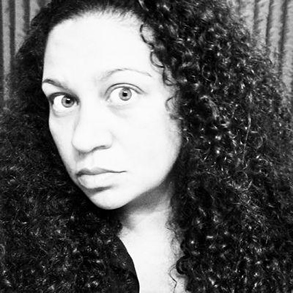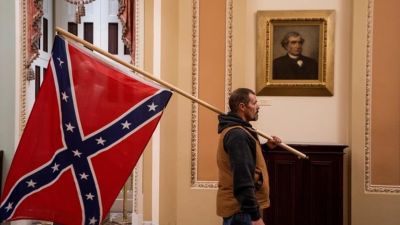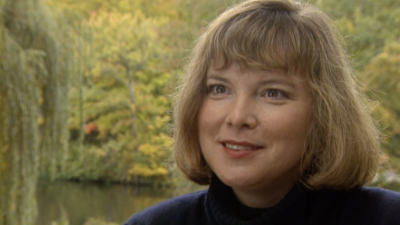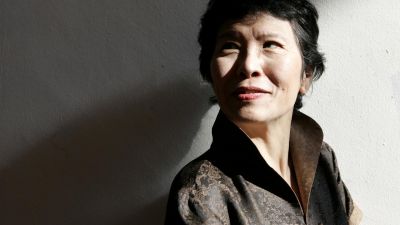April is National Poetry Month, and we’re celebrating by featuring examples of “civic” poetry from new and familiar voices. Throughout the month we’ll be discussing what it means to be civic through the art of words. Join us on Twitter at #civicpoetry.
Poet Kyle Dargan spoke with Amanda Johnston for our civic poetry month feature.
Kyle Dargan: What do you believe poets and poetry can add to the conversation around public issues, social justice, the environment?
Amanda Johnston: Poetry is the heartbeat of language. It’s the blood rhythm of our humanity. Beyond words on the page, poetry is the energized pulse that resonates from one being to the next across space and time. This is to say the arc of poetry documents the human condition. Poets keep an ear against the chest of the present and translate nuanced and collective emotions or concerns into sirens that reach the hearts and minds of others. Through intimate lines and precise images, poetry can open a way into deeper thought, understanding, and empathy for any issue.
— Amanda Johnston
KD: What does the word “change” imply for you, and do you have any personal theory of change?
AJ: Change is a quantifiable transition from one state to another. It can be measured scientifically or observed in actions. I’ve witnessed firsthand how poetry can be a powerful catalyst for change. I’ve watched poets share work that sparked conversations with people who may not have dared to speak out before. I’ve used poetry as a tool in community organizing to empower others to become actively engaged in local and national politics. Change is a force that might begin with a whisper and grow into a revolution.
KD: What, if anything, have you been doing or thinking about differently as an artist since the 2016 political cycle?
AJ: In November of 2014, after the non-indictment of Daren Wilson in the murder of Mike Brown, I watched Ferguson burn with sadness and anger. I was saddened and full of rage. I was activated and immediately turned to the poets, my friends and peers, to organize our voices to speak out against police violence and injustice. Mahogany L. Browne, myself, and others created the #BlackPoetsSpeakOut campaign. Throughout the years leading up to the 2016 election, we worked tirelessly to rally poets and allies to demand action from elected officials against the state sanctioned killing of black and brown people. I remind people that this work started under President Obama. I remind them of that as we continue to transition into life under the Trump administration that is hard at work to undermined and repeal the social advances we made. James Baldwin said, “The poets (by which I mean all artists) are finally the only people who know the truth about us.” I come back to Baldwin’s words as a meditation on what we as artists have done and what we must continue to do as language is manipulated to persuade and abuse the people. I remember this and know that the defunding of the arts and education is a direct threat to the power artists have to reach and empower the people with the truth.
This poem is a loose sonnet, but one element of the sonnet it firmly adheres to is the “volta,” that turn or shift in perspective. What do you intend to be the effect of recreating this uncertainty that many ethnic minorities feel — regardless of their class, gender or company — in their interactions with the police?
I wrote this poem after my daughter called me hysterically crying. An officer had stopped to help when she and her boyfriend were on the side of the road with a flat tire. Between sobs, she kept repeating I know it didn’t happen, but it could have. She meant that the officer who showed up didn’t assault her, had not killed her, but could have. I wanted to allow space for that moment of fear to materialize, to become a physical thing in the image of a heavy hand still dangerous at rest. I wanted to witness and testify that her fear was not without reason. I wanted to flood the space with the terror she felt, that I’ve felt, and black and brown people continue to feel under the US police state. I want the reader to find themselves in those lines under the hand of power unsure if this will be the moment it drops on them.
When My Daughter Wasn’t Assaulted
She shook with fear, or was it guilt,
at the officer’s unraised hand and smile.
How she leaned away, slowly, when he called
a tow truck instead of backup.
How her tears fled when he showed mercy
over rage for the couple on the side of the highway,
flat tire wasted against asphalt. She couldn’t help
but look at her white boyfriend pacing
along this strip of road and wonder, what if
this was a different part of Texas?
What if this hero was a different shade of power?
Would she be so lucky, or was it luck,
if the absence of a known pain
is just a heavy hand in repose?
“When My Daughter Wasn’t Assaulted” originally published in No, Dear (Fall 2016)




